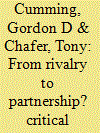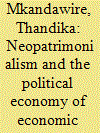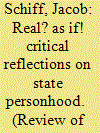|
|
|
Sort Order |
|
|
|
Items / Page
|
|
|
|
|
|
|
| Srl | Item |
| 1 |
ID:
108509


|
|
|
|
|
| Publication |
2011.
|
| Summary/Abstract |
At the December 1998 Saint-Malo summit, Britain and France promised to set aside past rivalries and work together on African issues. While brief indications were given as to possible areas of bilateral and 'bi-multi' cooperation, the terms and scope of this 'partnership' were not spelt out. Was this to involve only sporadic collaboration? Or was it to be an institutionalised partnership, such as the Franco-German tandem, or perhaps a more intuitive alliance, such as the Anglo-American 'special relationship'? These questions are central to this article, which begins by showing how Anglo-French relations in Africa were largely marked by rivalry from the colonial era to the early post-Cold War period. Drawing upon extensive interviews, it demonstrates how, over the last decade or so, closer linkages have developed between the UK and French administrations and how there has been a greater degree of cooperation in response to the key challenges of Africa. It then uses a neo-classical realist framework to explain the readiness or reluctance of Britain and France to collaborate on Africa. It concludes by suggesting that, while there has been progress in 'deconflictualising' African policies, cooperation has been, and is likely to remain, limited.
|
|
|
|
|
|
|
|
|
|
|
|
|
|
|
|
| 2 |
ID:
139924


|
|
|
|
|
| Summary/Abstract |
During the past two decades, neopatrimonialism has become the convenient, all purpose, and ubiquitous moniker for African governance. The school of thought behind this research program, which the author refers to as the neopatrimonialism school, has produced an impressive literature on Africa. Its analysis informs policymakers and its language permeates media reportage on African states. While neopatrimonialism has long been a focus of development studies, in recent times it has assumed politically and economically exigent status. The school identifies causal links between neopatrimonialism and economic performance, and makes predictions drawing from what is referred to as the "logic of neopatrimonialism." Neopatrimonialism is said to account for trade policies, hyperinflation, economic stagnation, low investment in infrastructure, urban bias, andultimately, the lack of economic development in Africa. This article examines the empirical basis of predictions and policy prescriptions. It argues that while descriptive of the social practices of the states and individuals that occupy different positions within African societies, the concept of neopatrimonialism has little analytical content and no predictive value with respect to economic policy and performance.
|
|
|
|
|
|
|
|
|
|
|
|
|
|
|
|
| 3 |
ID:
086152


|
|
|
|
|
| Publication |
2008.
|
| Summary/Abstract |
In a 2004 forum, Alexander Wendt, Patrick Jackson, Colin Wight and Iver Neumann asked two questions about state personhood: Are states real, or merely as-if? Are they people? I question the terms of their debate, which relies upon a problematic distinction between 'real' and 'as if'. Drawing largely upon Foucault, I challenge that distinction. This challenge has important theoretical and normative implications. Theoretically, a discourse of state personhood is completely unnecessary to understand world politics. Normatively, by tightly linking personhood and responsibility, some of the authors obscure important dimensions of responsibility to and respect for the non-human world.
|
|
|
|
|
|
|
|
|
|
|
|
|
|
|
|
|
|
|
|
|